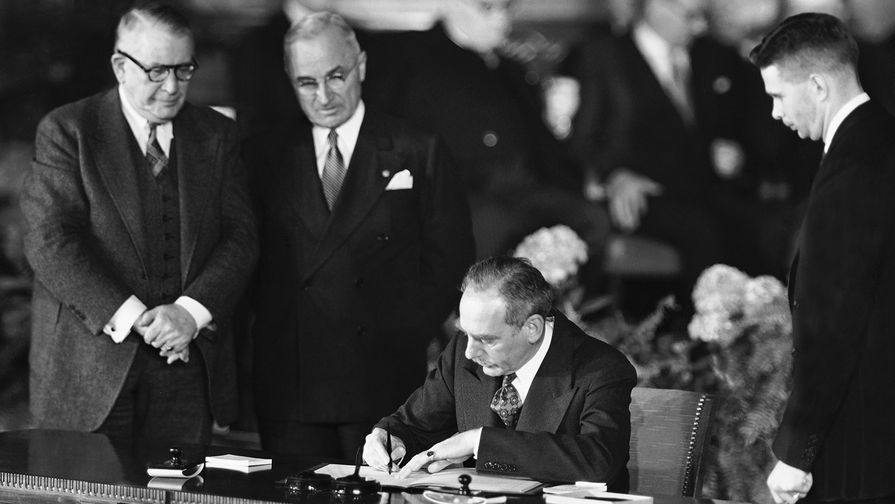NATO Secretary General Jens Stoltenberg said that Russia is no longer seen as a partner of the alliance. In an interview with the German newspaper Bild am Sonntag, he said that NATO perceives Moscow as a threat to its security.
“As the world changes, so does NATO. And the world has become more dangerous. “We will declare that Russia is no longer a partner, but a threat to our security, peace and stability.”
He also said that China will also be mentioned in the new NATO strategic concept.
“The rise of China is a challenge to our interests, values and security,” the secretary-general said.
NATO’s strategic concept defines a long-term strategy, identifies the alliance’s official goals and objectives and potential threats. The current concept of “Active participation, modern defence” has been in force since 2010, the document lays out NATO’s three main tasks: collective defence, crisis management and security through cooperation.
From Stalin to Lisbon
From 1949 until the collapse of the USSR in 1991, NATO strategists developed four Strategic Concepts – classified. They mainly developed ways to confront the Soviet Union and the Eastern Bloc and outlined views on the use of nuclear weapons by the alliance.
The strategic concept of 1991 was significantly different from its predecessors – firstly, it was not secret. Second, it aimed not at conflict but at ensuring the collective security of NATO members. It needed to develop partnerships and expand cooperation with Russia and other former members of the Warsaw Pact. The problem of the use of nuclear weapons was reduced to “a level sufficient to keep the peace”.

During the signing of the North Atlantic Treaty in Washington on April 4, 1949
AP
In 1999, a new Strategic Concept was adopted – its adoption was connected with the 50th anniversary of NATO. In the agreement, the member states of the alliance pledged to ensure defense, peace and stability in the “broad Euro-Atlantic region”. New risks included terrorism, human rights violations, political instability and the proliferation of weapons of mass destruction.
After the attacks on the USA on 11 September 2001 and the start of the wars in Iraq and Afghanistan, NATO had to reflect the changes in its policy to a new concept. In 2006, the leaders of the countries participating in the alliance approved the Comprehensive Policy Guidelines. By preserving the main provisions of the 1999 Strategic Concept, deepening interaction with the European Union was added to the aims and objectives of the alliance. Thus, NATO became the backbone of the European security system.
The Alliance’s response forces have been given broad powers to take counter-crisis measures anywhere in the world. According to paragraph 6 of part 2 of the document, NATO will intensify its cooperation with supranational organizations and increase its participation in processes that do not fall under the jurisdiction of the alliance.
NATO adopted the seventh consecutive modern Strategic Concept in Lisbon in 2010. For the first time since the end of the Cold War, it has implicitly, though not directly, pointed to Russia as a possible threat. The anxiety of the alliance countries was caused by the gas wars between Russia and Ukraine in connection with the inability of Kiev to pay for Russian energy supplies.
There was talk of improving NATO’s relations with Ukraine and Georgia. The eastward expansion process associated with the 1950s was continued – but not directly stated.
There was an increase in Russia’s economic and military potential, the protection of a large number of nuclear weapons. As NATO continues to expand by accepting new members from former countries of the socialist bloc and Soviet republics, it believes Moscow should keep its missiles as far away from the alliance’s borders as possible.
new reality
In May 2022, Jens Stoltenberg described the new NATO concept as the foundation of the “age of strategic competition.” It should be adopted at the summit in Madrid on 28-30 June.
Bloomberg reported that NATO could present Russia’s actions as a direct threat in the new strategic concept. According to the source of the publication, the position of the alliance may change if Moscow “changes its behavior.”
Moreover, the report on the reform of the NATO 2030 alliance identified Russia as the main military threat to the bloc. The document states that the alliance aims to strengthen their ability to contain Russia while maintaining a dialogue of peaceful coexistence on the basis of the Russia-NATO Council. At the same time, NATO is fully prepared to engage in a dialogue from a position of strength.
The US representative to NATO, Julianne Smith, argued at the beginning of June that Russia would be called the main threat in the new strategic concept of the alliance. Also, according to him, the document will draw attention to the rapprochement between the Russian Federation and China, especially given the joint statement of Vladimir Putin and Xi Jinping in February. It was stated that the friendship between Moscow and Beijing “has no borders” and that there is no “forbidden zone” in the cooperation between the two states.
US Secretary of Defense Lloyd Austin stressed that NATO does not want a direct conflict with Russia – it “will quickly turn into a different kind of struggle, and no one wants to see it.”
Russian officials regularly accuse the United States and NATO of ignoring important international security issues and expanding eastward.
Source: Gazeta
Calvin Turley is an author at “Social Bites”. He is a trendsetter who writes about the latest fashion and entertainment news. With a keen eye for style and a deep understanding of the entertainment industry, Calvin provides engaging and informative articles that keep his readers up-to-date on the latest fashion trends and entertainment happenings.

